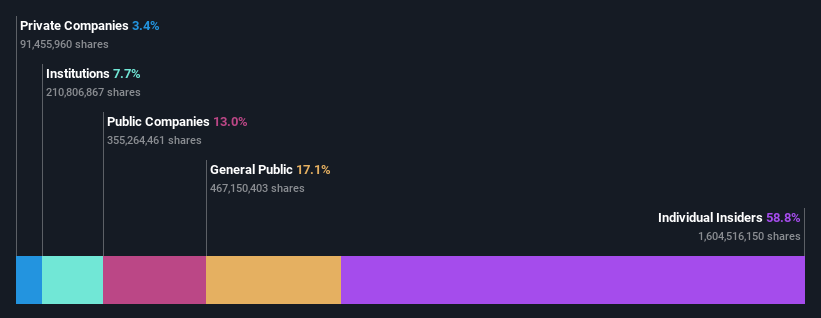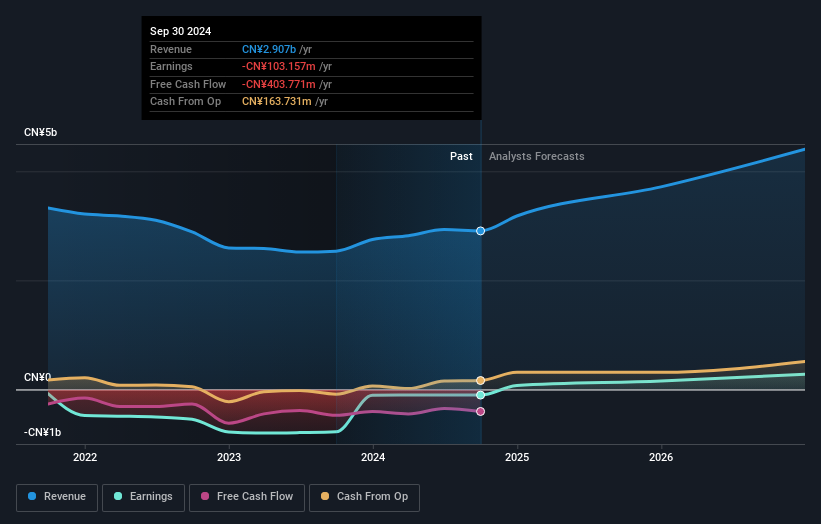Beijing Shiji Information Technology Co., Ltd. (SZSE:002153) CEO Zhong Chu Li's holdings dropped 3.7% in value as a result of the recent pullback

Key Insights
- Beijing Shiji Information Technology's significant insider ownership suggests inherent interests in company's expansion
- Zhong Chu Li owns 55% of the company
- Ownership research along with analyst forecasts data help provide a good understanding of opportunities in a stock
Every investor in Beijing Shiji Information Technology Co., Ltd. (SZSE:002153) should be aware of the most powerful shareholder groups. With 59% stake, individual insiders possess the maximum shares in the company. In other words, the group stands to gain the most (or lose the most) from their investment into the company.
And last week, insiders endured the biggest losses as the stock fell by 3.7%.
Let's delve deeper into each type of owner of Beijing Shiji Information Technology, beginning with the chart below.
Check out our latest analysis for Beijing Shiji Information Technology

What Does The Institutional Ownership Tell Us About Beijing Shiji Information Technology?
Institutions typically measure themselves against a benchmark when reporting to their own investors, so they often become more enthusiastic about a stock once it's included in a major index. We would expect most companies to have some institutions on the register, especially if they are growing.
We can see that Beijing Shiji Information Technology does have institutional investors; and they hold a good portion of the company's stock. This implies the analysts working for those institutions have looked at the stock and they like it. But just like anyone else, they could be wrong. If multiple institutions change their view on a stock at the same time, you could see the share price drop fast. It's therefore worth looking at Beijing Shiji Information Technology's earnings history below. Of course, the future is what really matters.

Hedge funds don't have many shares in Beijing Shiji Information Technology. The company's CEO Zhong Chu Li is the largest shareholder with 55% of shares outstanding. This essentially means that they have significant control over the outcome or future of the company, which is why insider ownership is usually looked upon favourably by prospective buyers. With 13% and 3.6% of the shares outstanding respectively, Alibaba Group Holding Limited and Mei Rong Jiao are the second and third largest shareholders.
While it makes sense to study institutional ownership data for a company, it also makes sense to study analyst sentiments to know which way the wind is blowing. There are a reasonable number of analysts covering the stock, so it might be useful to find out their aggregate view on the future.
Insider Ownership Of Beijing Shiji Information Technology
While the precise definition of an insider can be subjective, almost everyone considers board members to be insiders. The company management answer to the board and the latter should represent the interests of shareholders. Notably, sometimes top-level managers are on the board themselves.
Insider ownership is positive when it signals leadership are thinking like the true owners of the company. However, high insider ownership can also give immense power to a small group within the company. This can be negative in some circumstances.
Our information suggests that insiders own more than half of Beijing Shiji Information Technology Co., Ltd.. This gives them effective control of the company. That means insiders have a very meaningful CN¥12b stake in this CN¥20b business. Most would be pleased to see the board is investing alongside them. You may wish to discover if they have been buying or selling.
General Public Ownership
With a 17% ownership, the general public, mostly comprising of individual investors, have some degree of sway over Beijing Shiji Information Technology. While this size of ownership may not be enough to sway a policy decision in their favour, they can still make a collective impact on company policies.
Private Company Ownership
We can see that Private Companies own 3.4%, of the shares on issue. It might be worth looking deeper into this. If related parties, such as insiders, have an interest in one of these private companies, that should be disclosed in the annual report. Private companies may also have a strategic interest in the company.
Public Company Ownership
Public companies currently own 13% of Beijing Shiji Information Technology stock. We can't be certain but it is quite possible this is a strategic stake. The businesses may be similar, or work together.
Next Steps:
While it is well worth considering the different groups that own a company, there are other factors that are even more important.
I always like to check for a history of revenue growth. You can too, by accessing this free chart of historic revenue and earnings in this detailed graph.
But ultimately it is the future, not the past, that will determine how well the owners of this business will do. Therefore we think it advisable to take a look at this free report showing whether analysts are predicting a brighter future.
NB: Figures in this article are calculated using data from the last twelve months, which refer to the 12-month period ending on the last date of the month the financial statement is dated. This may not be consistent with full year annual report figures.
Valuation is complex, but we're here to simplify it.
Discover if Beijing Shiji Information Technology might be undervalued or overvalued with our detailed analysis, featuring fair value estimates, potential risks, dividends, insider trades, and its financial condition.
Access Free AnalysisHave feedback on this article? Concerned about the content? Get in touch with us directly. Alternatively, email editorial-team (at) simplywallst.com.
This article by Simply Wall St is general in nature. We provide commentary based on historical data and analyst forecasts only using an unbiased methodology and our articles are not intended to be financial advice. It does not constitute a recommendation to buy or sell any stock, and does not take account of your objectives, or your financial situation. We aim to bring you long-term focused analysis driven by fundamental data. Note that our analysis may not factor in the latest price-sensitive company announcements or qualitative material. Simply Wall St has no position in any stocks mentioned.
About SZSE:002153
Beijing Shiji Information Technology
Beijing Shiji Information Technology Co., Ltd.
Excellent balance sheet with reasonable growth potential.

